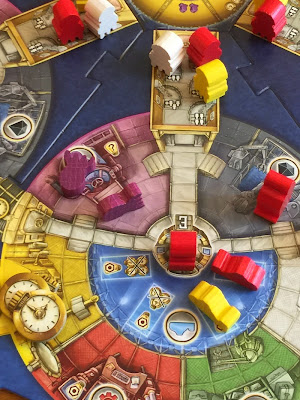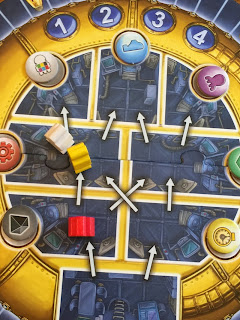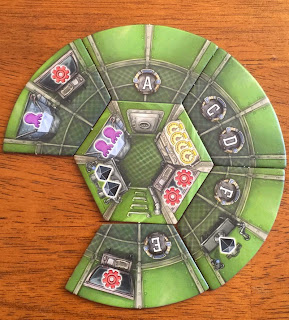 |
| AquaSphere - mid play |
Thanks to my friend Kurt for this guest review of AquaSphere. If you like Kurt's opinions, check out his new video series on solo games.
First off, let me come clean with this -- I�m not a fan of Stefan Feld games in general. Even if I like a game of his, they don�t leave me thinking about them afterwards in terms of what I learned and want to do next time. But I played AquaSphere at the same convention where I tried a bunch of other new games and was surprised to find myself � thinking about it afterwards. In fact, I ended up getting a copy because my gut told me there were several plays here, and I�m glad I did. I mention this context as emphasis that this review is an endorsement of a Feld game from someone who�s usually not a Feld fan, so take that for what it�s worth.
AquaSphere is mechanically well designed and thematically disconnected, but that�s pretty much par for the course with Feld, isn�t it? The multiple ways to get points but limited actions gives it some heft without being too much of a brain burner. It�s really quite simple once you get past your first learning game as there�s an illusion of abundance of choice due to the two interrelated boards and all the actions, but you can really only program three (or so) actions a turn, so for some people the first play may be a �head wrapper� but the light should go on pretty quickly especially with an adept teacher. And I don�t mind the lame thematic connection to my actions. I know when I�m playing a Feld game it�s about the mechanisms, and I find them engaging enough here to not care why octopods are invading and why I should want to �clean� them.
I�m clearly entertained by games where you chain actions together in ways that pay off relative to what other players are doing. This one reminds me of two other action chaining games I quite like, Kanban and Tzolkin: the Mayan Calendar, for how you coordinate your actions against the pull of not just �what�s good� but �when�s good.� You're working on your own priorities in a shared space with others to beat them to bonus thingies and also time your actions in such a way that you bump their pieces out and end up with your pieces in the right spots at the end of the round. It�s a quintessential action puzzle game.
The thrust of the play is programming versus acting. You have two separate boards (that appear garish to the neophyte) that work interrelatedly. On the Headquarters board, you will move your scientist pawn to program your bots with certain actions from the seven available. Then you move your scientist dude on the Lab board using �time� to get around and poop, er, drop a bot to then instantly take the action it was programmed for. So, 1) program bot, 2) move scientist (or not), 2a) take action with programmed bot. Repeat until you have to pass. It�s actually pretty simple.
 |
| Headquarters board |
You essentially have a load-then-fire process which provides a surprising amount of player interaction via the signaling of everyone�s motives in the form of their programmed actions. If I can see you have a bot ready to do something that I want to do, I will have to consider my turn carefully. What�s the point of programming something that you�re about to do on your turn anyway? More player interaction happens in the placing of bots on the board in a Highlander, �There can be only one!�, way. When you drop a bot, you displace any previous ones there, which is a way of scoring VPs for yourself and taking them away from others. (Ooh, maybe this should�ve been themed as such with the bots being the heads of other immortals?) Less direct interaction happens in the race to get particular bonus power cards or lab extensions.
And what are these actions that you�re going to all this trouble to program? Without going into a full blown rules explanation, you�re either acquiring bonus power cards or lab extensions that help your ability to do stuff in the game or you�re actually doing that stuff. Bonus power cards are pretty self-evident. Lab extensions serve to increase your capacity for stuff but also may have letters A-F on them.
Collecting lab extensions with letters is worth points in the standard triangular scoring sequence that applies to all collected stuff in the game. Furthermore, the game squeezes you by requiring your scientist pawn to use time markers to get around the undersea lab. You may have the bot programmed the way you want and the opportunity staring you in the face, but not have enough time to get to that side of the board and take the action. So some of your actions are simply spent acquiring more time which always feels suboptimal to me considering you can only program three actions per turn. Part of the challenge then is finding other ways of getting time such as via bonus power cards.
Now, let�s take a look at the depth of strategy in the game. I would say the game is heavily tilted towards tactics but is not without strategy. Your strategy may be to go for the A-F lab extension bonus or the placing submarines bonus or something else in concert with a bonus power card. Between the �action blender� and the interference of other players, you will focus each turn more on what you can do versus what you would like to do, but there is some player agency towards an overall strategy, and the bonus power cards and lab extensions you collect will contribute towards that focus (or you�re not playing well).
 |
| Personal pod after multiple improvements |
And therein lies the fun of the game: cutting off Mr. Feld�s restraints each turn (action blender, time markers) to execute actions that fit into the framework of your strategy while outmaneuvering your opponents to move before (to get stuff before they do) or after (to knock their bot out and place yours). It�s all a series of mini action puzzles that you�re trying to put together for yourself each turn while cutting off the heads of other immortals as they try to configure theirs. So what�s not to like?
No game is perfect, and what I don�t like about this one is the fiddliness involved, especially setting up and resetting between turns. I probably have felt this more prominently due to the fact I have taught new players in all my plays so far so I�m the one setting up the game and directing how to reset the board between turns. You have to reset the game before you play and then essentially set it up all over again between turns. It grows a little tiresome though it�s certainly manageable.
Also, we seem to forget in every game to give points for placing submarines and taking bonus power cards. Most probably because it�s counter-intuitive to get points for doing things that are already helping you (I take a bonus power card AND I get VPs? Huh?). But it�s Feld after all, and he�s not ashamed to give points willy nilly. He doesn�t care, and to prove it, he gives three points to people who walk by and watch the game for five seconds or more. Don�t believe me? It�s in the rule book. Probably.
All in all, I enjoy this one the more I play it. At first it felt like you could only focus on fighting the action blender but I�ve come to appreciate how you wrangle the game and combat other players at the same time. The variable setups ensure each game plays out differently, and a review of the game forums reveals that more experienced players find the scoring avenues are equal. I find myself thinking about those avenues and how I could�ve managed my bonus power cards in better concert with my actions. I look forward to more time under the sea answering those questions.
Board Game Reviews by Josh would like to thank Tasty Minstrel Games for providing a review copy of AquaSphere.


0 komentar:
Posting Komentar